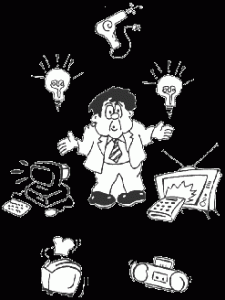
This is the concluding article in the two part series on working memory. Part I can be found here: Optimizing Your Working Memory – Part I
To review: Working memory is that part of the brain where you hold items in conscious attention. It’s the scratch-pad where you manipulate maps in conscious reasoning. It is a critical component of all kinds of intelligence (IQ, EQ, etc.)
The problem with working memory or your conscious mind is that it is very resource intensive, it is very small, and it is easily overwhelmed by distractions and emotions. A lot of new research is showing that cognitive effort depletes your mental resources and you perform significantly worse on subsequent tasks.
The best solution is to learn optimize your use of your limited mental resources.
How To Optimize Your Working Memory – Continued
-
In reality you can only focus on one conscious task at a time. When you multi-task, you are simply switching between tasks and that context switching is an expensive operation that uses up limited resources. Research proves that accuracy drops off with multi-tasking. Overall speed does not increase.
-
Most people accept numerous distractions even when they are not multi-tasking. Those little email pop-ups or dings take mental resources and reloading your working memory is expensive. Experiments have shown that even if you are instructed to ignore all email or text message chimes, they disrupt and harm your thinking process. By accepting any distractions you are wasting precious resources and impacting your ability to perform, regardless of what you subjectively feel you are capable of doing. Your subjective feeling is simply not accurate. I put on sound-isolating earphones and play rain white noise to eliminate auditory distractions. If you are working on your computer, close all the other windows. If you don’t close your email or your browser you will be tempted to check them. Work someplace where you will not be interrupted.
-
When you need to focus on an activity, you need to clear your mind of internal distractions first. Internal distractions can be just as disruptive as external distractions. Get them out of your head and onto a list with a plan for dealing with them later, so your brain does not continue to force them into your awareness when you are trying to focus on something else.
-
Imagine that you are trying to prioritize a list of things you want to accomplish in various areas of your life and that list contains 25 items. It will be very difficult for you to prioritize that list because first prioritizing is very difficult mentally, and second you can’t hold that many items in your mind at the same time. Chunk the list into broad categories (say work, home, relationships, etc.). Then chunk the broad categories into sub-categories. This is a neat little demonstration of the power of chunking.
-
I tried this idea once when I was tired and couldn’t decide on what I should work on and it produced an easy answer. The mind most easily compares two items. While you can compare four or five items, doing so is very taxing. So instead try a series of two-way comparisons instead. Let’s say I had ten items A through J and I wanted to pick one as the most important. Start at the top and compare A and B. A is more important so then compare A and C. C is more important and so then compare C and D. And so on. I find this to be a very effective way to quickly work my way through a list of items that I need to prioritize or choose from. Don’t agonize over individual decisions. If it’s that hard to decide it probably doesn’t matter that much.
-
Keeping a steady supply of glucose flowing to your brain is definitely a plus. The best way to do this is to eat frequent small healthy meals with low GI complex carbohydrates. I’ve been reviewing studies on what is best to eat when relative to mental performance and it’s just too complicated to review here. I hate to say this but given the evidence that glucose and caffeine can erase resource deficits, if you have an occasional emergency situation you could consider an energy drink. If you do this on any more than an occasional basis, you are going to hurt yourself more than help. These drinks have a definite downside and the high is usually followed by a crash. I like to use fruit as a quick pickup.
-
Mental performance is increased with supplemental oxygen. Blood carries both oxygen and glucose. Improving your blood and oxygen carrying capacity through exercise may be the single best thing you can do for your brain overall.
What do you think? Leave a comment and join the conversation.

Tagged as: working memory

